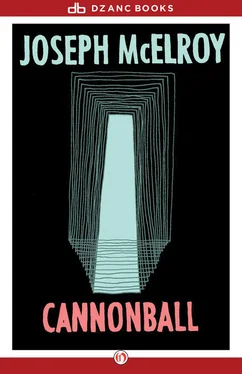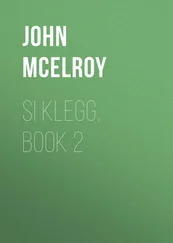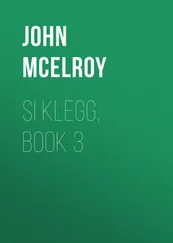Joseph McElroy - Cannonball
Здесь есть возможность читать онлайн «Joseph McElroy - Cannonball» весь текст электронной книги совершенно бесплатно (целиком полную версию без сокращений). В некоторых случаях можно слушать аудио, скачать через торрент в формате fb2 и присутствует краткое содержание. Год выпуска: 2013, Издательство: Dzanc Books, Жанр: Современная проза, на английском языке. Описание произведения, (предисловие) а так же отзывы посетителей доступны на портале библиотеки ЛибКат.
- Название:Cannonball
- Автор:
- Издательство:Dzanc Books
- Жанр:
- Год:2013
- ISBN:нет данных
- Рейтинг книги:5 / 5. Голосов: 1
-
Избранное:Добавить в избранное
- Отзывы:
-
Ваша оценка:
- 100
- 1
- 2
- 3
- 4
- 5
Cannonball: краткое содержание, описание и аннотация
Предлагаем к чтению аннотацию, описание, краткое содержание или предисловие (зависит от того, что написал сам автор книги «Cannonball»). Если вы не нашли необходимую информацию о книге — напишите в комментариях, мы постараемся отыскать её.
continues in McElroy's tradition of intricately woven story lines and extreme care regarding the placement of each and every word. A novel where the sentences matter as much as the overall story.
Cannonball — читать онлайн бесплатно полную книгу (весь текст) целиком
Ниже представлен текст книги, разбитый по страницам. Система сохранения места последней прочитанной страницы, позволяет с удобством читать онлайн бесплатно книгу «Cannonball», без необходимости каждый раз заново искать на чём Вы остановились. Поставьте закладку, и сможете в любой момент перейти на страницу, на которой закончили чтение.
Интервал:
Закладка:
For us , I say.
For The Inventor’s door opening had twisted my own story round to see instead of a stretcher for a medevac carried out of the stairwell like a companionway into the still heaving wreckage of that lower floor below the palace pool, a surveillance monitor totaled, two or three of them — shredded — down by where the blast had detonated and the Chaplain had been crushed, and the need of somebody’s eyes to see for themselves if not finish the job.
The pitted door gashed, gnawed-looking, but so freshly painted in half, saffron above, purple below, the soft oak itself in an instant had shown me how the door would be opened. Swiftly by The Inventor or not at all. Dead bolt snapped open-and-shut first as a test by Milt. A little kid in there might look up at the door and call out or fling it open; a bigger one would have yanked without first turning the knob — all people are different sometimes for their own sake at best (the war said — though like History, it could be made to say anything, or nothing, which was harder perhaps in truth.) And my sister, it occurred to me, would sometimes peer out the far corner of our living room window slantwise. All these openers, upon opening, would take a good look at you. But the ravaged one who opens to me now already talking a flood of hope that I had come because I was expected, and recollecting “ last time,” and having begun talking already, it seems, a few minutes ago, like an experienced poor tramp on a moving train who jumps off sideways and hits the ground running, was Cheeky, her old brown forehead spotted more than ever and now scabbed as if she might change her skin or might be stuck with it.
“Vera Cruz remember — I didn’t get to tell you, because Umo had to swing Milt around my ceiling. They were upset with you, and you have the snapshot I took of him coming down the gangway because he told me you did, such a big roly-poly boy, such a small suitcase over his shoulder, what shoulders — and that was the last I saw of him for two months. Some welcome. And I got sick in Vera Cruz but not a bad place to be sick and I went bass fishing with this.” Cheeky touched her forehead and her bare arm. “Made the best of it before I took the train home, went fishing with a former Miss Costa Rica who was on vacation from her job at the national park studying the mantled howler monkeys and their strange family turnovers—”
“I tould harr not to go,” called The Inventor from the far room.
“He had no papers!” Cheeky screamed like I didn’t know what, meaning Umo, I assumed.
“You knew that?” I said.
“And here they broke in,” said The Inventor, changing to the current subject, “took my envelopes — forrteen shoe box esful.” His laughter unseen, edgy, Cheeky’s by contrast agreed, transmitting with her brown fingers on my arm all but family memory extending me hither and yon. “Fourteen!” I said to a man who believed in words coming out of nowhere — that could be a good thing. “He had no papers,” Cheeky calls back.
“And now you have brought me something from the War,” the voice continues learned in the blinds-drawn shadows. “To translate,” I called out. “And he’s wounded, you know,” said Cheeky—“his shoulder—” “He knows.” “We need you. What’s this?” Through my sleeve she felt my hard, gristly scar like a sinew growth. Were they mad at me? you had to wonder. Hard times (“We need you”), news of The Inventor’s green card to be reapplied for unexpectedly, Cheeky’s lease, her runaways moved on, and Umo —
But the man, nearer now, still unseen, interrupts. Hearings have begun? Can something be done, about the War, the terrorist governments in the driver’s seat, the people being nickel-anddimed, the Cabinet, the money, when what are they about?
“He dreamt you were there,” Cheeky confided to me. (Where? I thought.) She a starved little horse of an extreme Southern California human. Beyond her, the long tables empty now, the glassed-in display cases of this nomad imagination-for-sale-orbrowsing (“no problem”) crammed even fuller and anchored-down-looking, my God, a shadowy light as from water waiting for company and sound. And in the other direction, from which I’d come, beyond the boarded-up window an outdoor whirring sound, a sidewalk, a car door somewhere, a footfall, someone passing in the brightness, and I had to show what I came for. The Ziploc out, Syriac characters rippling with the page and almond-dye letters (or were they just ancient black-ink-faded) with angular arms like minute megaphones, backward r ’s, an authority instinct with care, beauty, faint water stain as if, now that I’m about to hand it over, I had never really looked at it.
Why am I speaking about Umo to this couple who I know are reluctant to comment (the woman touching me, the man as yet unseen — who are they to me)? What am I up to? Is it the Scrolls, my part in them, which even if bizarre, as I sometimes guess, won’t matter? Consulting another oracle, a childhood sanctuary of the miscellaneous? Is it friendship? Umo’s résumé?
For he had divided his time between Baja and here and every point between, a catalogue of jobs if you wanted to know about jobs not for illegal kids but an infinitely resourceful soul who came in handy anywhere from here south able to turn always Between into a possible home. No end to it. Though his music job in the war zone I leave out, partnering an enemy combatant. The Inventor at last — he stands in the inner doorway, his face of a dye darkly material and fierce.
Cheeky is so upset, “He said he’s glad to be thought dead,” she says.
“How does he know he is?” I said, so religiously almost relieved to be learning it for the first time for certain, hearing the front door sticking. I knew someone, I was telling these vivid people, who was dead but thought not to be, I said; whereas Umo … Umo was pretty noticeable, wasn’t he? Was it he who’d painted the front door? I asked, holding out the Ziploc yet turning from The Inventor to find, standing inside the front door having pushed it shut, my sister, who took my breath away.
20 make time free
A stranger to this house I was certain.
But not to the Ziploc she saw our irritated host take from my hand. She was dressed for her job, her dark hair tied back, her eyes bluer even than her shirt, her collar white, her black slacks tailored to her hips, cell phone at her waist, and some new partnership prophetically between us like a mysterious ultimatum quite beyond your control.
“I saw him dive twice, I never met him,” said my sister, “and somewhere in between I saw him hop into a truck on the interchange with cars streaming by, and he was glad to be alive,” said E-m. “And so were we. He acted out, sort of…for us, for my brother…he acted for us (?).” “No, no,” I said — how could she speak? “He met you ,” said Cheeky. “It’s always possible,” said my sister.
“—spek lak he did. Lak he knew you and Zach…ye’fathuh.”
“We knew of you, Sister,” said The Inventor. He had a lamp turned on with a green-glass shade, he was staring at the piece of Scroll and would not quite be able to give her the once-over. “I have read your envelopes, some of them, and seen how they affect those close to me. I have seen your car drive up in the middle of the night,” my sister said, “and heard it.”
“‘I have no life but this,’” said The Inventor, “I have harrd your brother say the seeme.” “It’s so,” said E-m, The Inventor’s theme uncanny or was it familiar through my sister? “Bottom lines I re cog nize but not just before,” said The Inventor. “I will be back in a matter of minutes.” He flapped the scrap of thin, stiff paper. “You don’t know how some fool might use your words, your ideas, your thought, your cut-up memory, philosophy, family, your gift, your shit,” said The Inventor, leaving the room. My sister looked about her and at me. Cheeky limped over to open a sliding glass display-case front.
Читать дальшеИнтервал:
Закладка:
Похожие книги на «Cannonball»
Представляем Вашему вниманию похожие книги на «Cannonball» списком для выбора. Мы отобрали схожую по названию и смыслу литературу в надежде предоставить читателям больше вариантов отыскать новые, интересные, ещё непрочитанные произведения.
Обсуждение, отзывы о книге «Cannonball» и просто собственные мнения читателей. Оставьте ваши комментарии, напишите, что Вы думаете о произведении, его смысле или главных героях. Укажите что конкретно понравилось, а что нет, и почему Вы так считаете.












